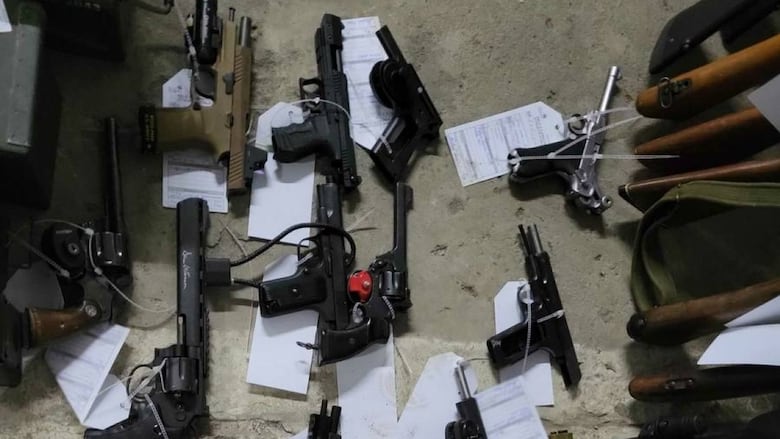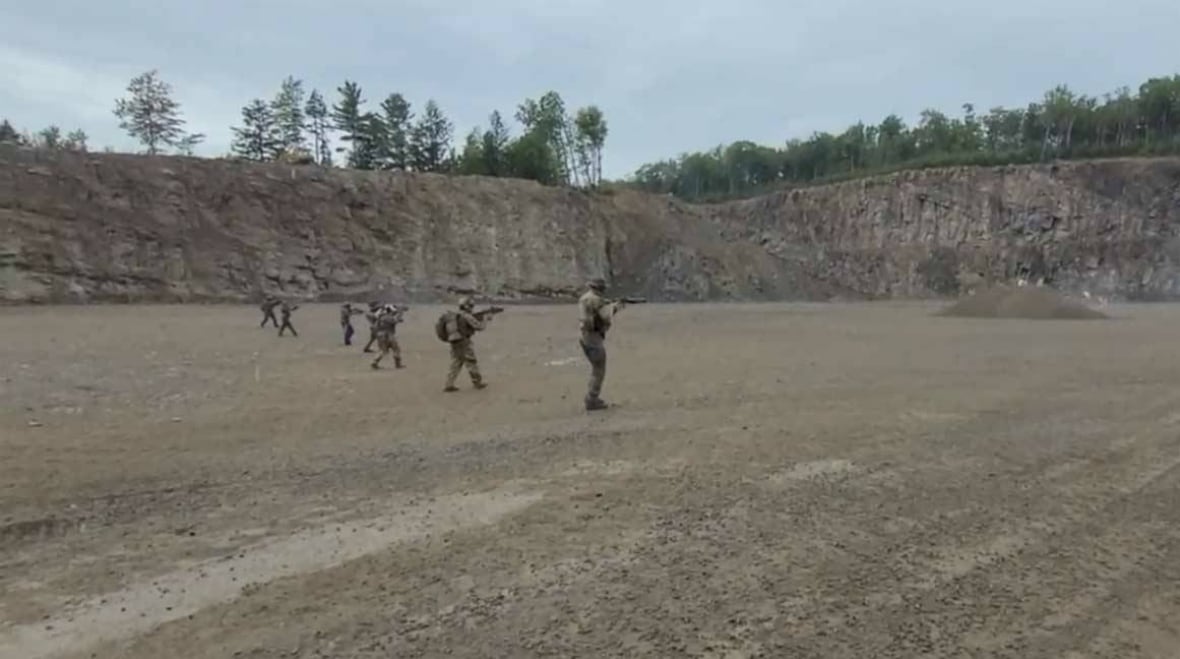RCMP charges military members allegedly plotting to form militia and seize land
3 Quebec men face terrorism-related charges after 2-year investigation

The RCMP has charged four men, including two active members of the Canadian Armed Forces (CAF), with being part of an extremist plot that allegedly involved creating an anti-government militia with a massive trove of weapons.
In a news release Tuesday morning, the Mounties said the group was involved in an alleged ideologically motivated violent plot "intending to forcibly take possession of land in the Quebec City area."
Three of them — Marc-Aurèle Chabot, 24, of Quebec City; Simon Angers-Audet, 24, of Neuville, Que; and Raphaël Lagacé, 25, also of Quebec City — have been charged with the serious offence of facilitating a terrorist activity. They also face weapon-possession charges.
"The three accused were planning to create anti-government militia. To achieve this, they took part in military-style training, as well as shooting, ambush, survival and navigation exercises," the RCMP said.
A fourth individual, Matthew Forbes, 33, of Pont-Rouge, Que., faces charges including possession of firearms, prohibited devices and explosives, and possession of controlled items. He also faces charges related to the Explosives Act and Defence Production Act, which regulates access to military supplies.
The men appeared in court virtually on Tuesday and remain in custody. Their next court date is July 14.
The Office of the Canadian Forces Provost Marshal said in a statement Tuesday evening that Forbes and Chabot are serving members — both corporals based at CFB Valcartier.
Without providing names, it said one of the four accused was also a former armed forces member, and the other a former civilian instructor with the Royal Canadian Air Cadets.

A colleague of Chabot's confirmed that he was serving last summer in the Vandoos, also known as the Royal 22nd Regiment. CBC News has agreed to withhold his identity because he was not authorized to speak publicly on Canadian Armed Forces matters.
The colleague expressed concerns about comments Chabot had made about the federal government and then prime minister Justin Trudeau. He described those comments as "almost treasonous."
A Facebook account belonging to Lagacé is filled with photos of him in military-inspired gear posing with firearms and posting against Bill C-21, the Liberals' gun control legislation. It also shows he was once a member of the cadet program.

An RCMP spokesperson said the investigation began in the spring of 2023 and determined the alleged activity began in 2021. The national police force also alleges that one of the accused was running an Instagram account aimed at recruiting members.
Guns, explosives seized
The RCMP said searches in the Quebec City area, in January 2024, led to the seizure of 16 explosive devices, 83 firearms and accessories, approximately 11,000 rounds of ammunition of various calibres, nearly 130 magazines and four pairs of night-vision goggles.
Police said some of the firearms were prohibited and the stockpile included "seized military equipment."
"Violent extremism remains a serious concern within Canadian and international society," the statement from the provost marshal's office said. "CAF members are prohibited from participating in an activity, or being a member of a group or organization, that relates to hate related criminal activities, and/or promotes hatred, violence, discrimination or harassment."
The provost marshal's office said military police, along with the Canadian Armed Forces, assisted in the investigation.

Jessica Davis, president of Insight Threat Intelligence and a former analyst with the Canadian Security Intelligence Service (CSIS), said the seizure is the largest cache of weapons and components in any terrorism incident in Canadian history.
"The amount of weapons and the amount of ammunition and the improvised explosive devices tells me that they were building up for something pretty significant," she said.
"They were either trying to recruit many more people, so they were going to need that level of weapons and ammunition, or they were preparing for some kind of siege."
She also said it's the first time in her recollection that active forces members have been involved with terrorism charges.
Armed Forces have struggled with extremist ties
The Canadian Armed Forces have been under pressure to better handle soldiers drawn to hateful views and extremism.
A 2022 report from the military's advisory panel on systemic racism and discrimination found the number of members belonging to extremist groups was on the rise.
Barbara Perry, director of the Centre on Hate, Bias and Extremism, has been researching the rise of extremism within the Canadian Armed Forces.
"To be frank, I might have expected something like this even sooner given what we've been seeing," she said.
While the motivation of the four men remains unclear, Perry said researchers have grown increasingly concerned about what she calls an "unholy trinity" in right-wing circles.
"You have an increasing obsession with weapons and guns," she said, combined with "explicit attempts to recruit people with military experience."
"And you add on to that then the hateful ideologies that are informing them, whether it's, you know, anti-immigrant sentiment or Islamophobia or anti-stateism," Perry said.
"That's a very dangerous combination."
In 2021, a U.S. judge sentenced former Manitoba army reservist Patrik Mathews to nine years in prison for charges related to what the FBI described as a neo-Nazi plot to instigate a race war in the United States.
That same year, former Canadian Forces reservist Corey Hurren pleaded guilty after storming the gates of Rideau Hall with loaded firearms and multiple rounds of ammunition, in an attempt to arrest Trudeau.
"This was an armed aggression against the government which must be denounced in the strongest terms," Justice Robert Wadden said at Hurren's sentencing.
A 2020 CBC News investigation of a Canadian Ranger unit uncovered how Erik Myggland, a British Columbia reservist who openly supported two far-right groups, was allowed to continue serving even after he had been identified by military counter-intelligence and interviewed as a potential threat.
With files from Murray Brewster



